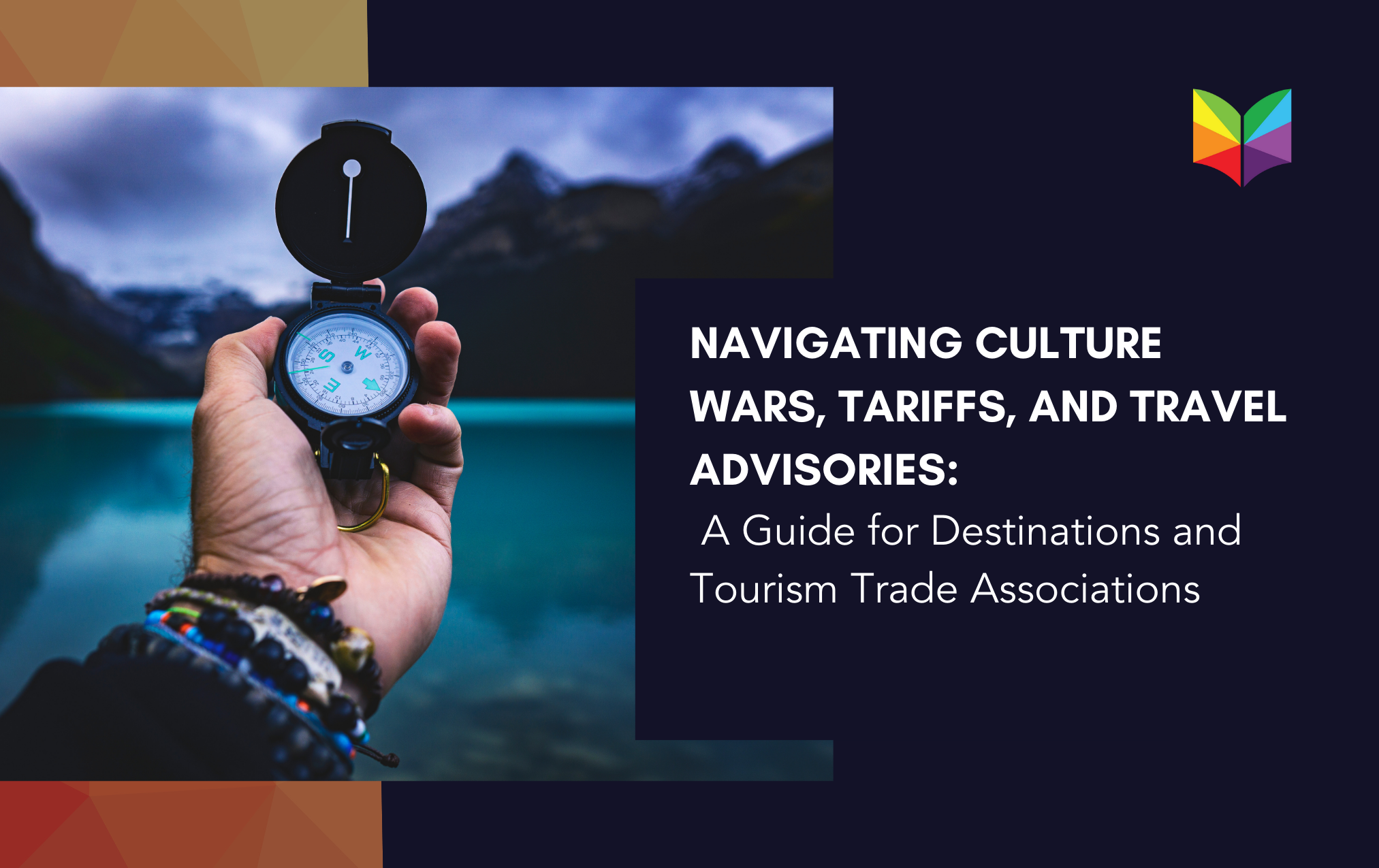
Navigating Culture Wars, Tariffs, and Travel Advisories: A Guide for Destinations and Tourism Trade Associations
Navigating Culture Wars, Tariffs, and Travel Advisories: A Guide for Destinations and Tourism Trade Associations
Travel is more than tickets and itineraries. It's a political act, an economic catalyst, and a mirror reflecting a destination's values. In today’s polarized world, destinations and tourism trade associations must learn to communicate effectively when confronted with contentious issues like culture wars, international tariffs, or travel advisories. While seemingly outside the traditional tourism narrative, these topics have a direct impact on traveler behavior, partner relations, and a community’s economic well-being.
Why These Topics Matter to Tourism
Tourism doesn’t operate in a vacuum. Decisions made in political chambers, global health councils, or even school boards can ripple through the visitor economy. Here’s how:
-
Culture wars (e.g., anti-LGBTQ+ laws, DEI rollbacks, or book bans) influence travel sentiment and destination desirability.
-
Tariffs and trade disputes can strain international partnerships, impact group travel affordability, or drive changes in supplier relations.
-
Travel advisories from governments or advocacy groups (like the NAACP or the Human Rights Campaign) may discourage travel to or from specific destinations, sometimes based on safety, sometimes on principle.
According to the World Economic Forum, “perceived safety and cultural alignment are top indicators of travel decisions.” And according to a recent U.S. Travel Association report, “86% of travelers say a destination’s values influence their intent to visit.”
The Role of Destination Leaders
Whether you're a DMO, a chamber of commerce, or part of a tourism training academy like Learn Tourism, your job includes representing and empowering your community while fostering honest, respectful, and economically resilient visitor experiences. That means you can’t sit these issues out.
Here’s how to get ahead of the conversation:
1. Acknowledge the Elephant in the Room
Don’t wait for a backlash. If your destination becomes the subject of a travel advisory or social media firestorm, silence implies complicity. Instead:
-
Proactively publish your organization’s commitment to safety, inclusion, and respect for all travelers.
-
Create a public statement or FAQ that clarifies what visitors can expect, especially if laws or cultural climates are evolving.
“[Learn Tourism] knows how to bring stakeholders into alignment, teach the positive impact of tourism on our community and do it all sustainably.”
— Linsey MacDougall, Broadway Across America
2. Train Frontline Staff to Address Tough Questions
Your hospitality workers and guides are ambassadors (or champions!) for your destination. Equip them to navigate these issues with empathy and confidence:
-
Use scenario-based training through platforms like Learn Tourism.
-
Roleplay responses to “Is it safe for someone like me to visit here?” or “I heard your state just passed a controversial law.”
-
Encourage honesty and empathy—acknowledging traveler concerns without defensiveness.
“Online training helps empower frontline professionals so they can answer difficult questions and showcase the ripple effect tourism has on every business and individual.”
— Eric Masterton, Visit Baltimore
3. Stay Engaged in Policy and Advocacy
Tourism leaders can’t afford to be apolitical. Decisions made by local or national governments affect your bottom line.
-
Join or initiate coalitions with regional stakeholders to respond to pending legislation.
-
Advocate for inclusive policies through your board, destination partners, and trade associations.
-
Use data from tourism analytics platforms to demonstrate the financial consequences of exclusionary laws or harmful rhetoric.
“Since partnering with Learn Tourism the nonprofit academy, our workforce development initiatives have seen remarkable progress.”
— Leslie Davis, Nashville Convention and Visitors Corp
4. Recognize the Realities Behind Travel Advisories
Sometimes, the decision to issue or lift a travel advisory has less to do with on-the-ground conditions and more to do with diplomacy, political retaliation, or advocacy goals.
-
Be transparent: Share with your audiences what has changed or what steps have been taken locally.
-
Focus messaging on practical safety, visitor resources, and community readiness to welcome travelers.
-
Empower locals with context and training to avoid alienation or misinformation.
5. Build a Learning Culture
Every incident—whether a travel warning, an activist boycott, or an international tariff—should be treated as a learning opportunity. Encourage your team and partners to engage in ongoing professional development.
-
Learn how similar destinations have responded successfully.
-
Integrate insights from adult learning science, such as scenario-based microlearning and social learning cohorts.
-
Revisit your messaging strategy regularly to ensure alignment with current values and market expectations.
According to the National Center for Education Statistics, “adult learners are more motivated when training is relevant, practical, and responsive to their personal and professional goals.”
Final Thought: Travel Is Political. That’s Why It’s Powerful.
Tourism is often where policy meets people. Destinations and associations that can navigate politically charged waters with integrity and insight will emerge not just unscathed, but stronger, more resilient, and more respected.
“[Learn Tourism] provides the platform to engage and connect seamlessly to DMO partners and their communities.”
— Richard Peterson, U.S. Cultural & Heritage Marketing Council
About Learn Tourism the nonprofit academy...
Learn Tourism is a 501c3 nonprofit organization dedicated to advancing the tourism industry through innovative educational practices and professional development initiatives. Our mission is to harness the power of science, business psychology, and adult education to build sustainable economies and enrich the tourism landscape.